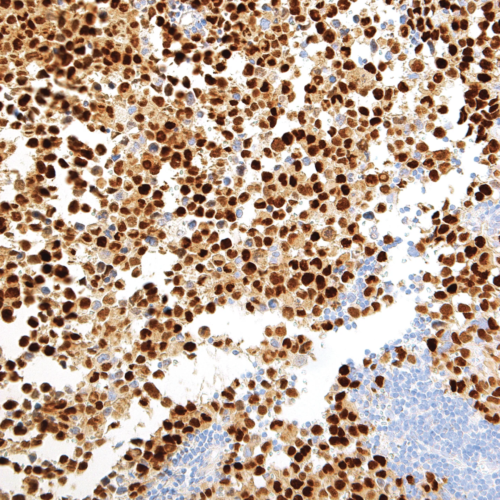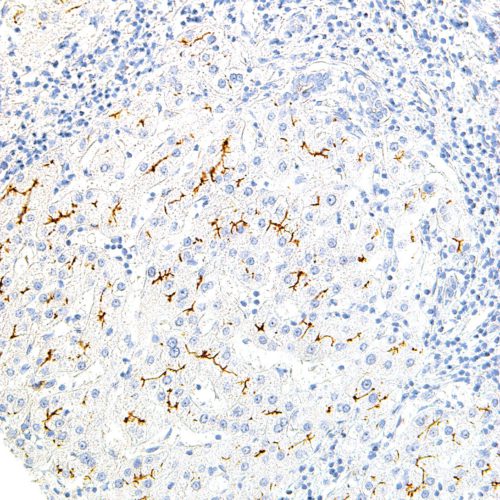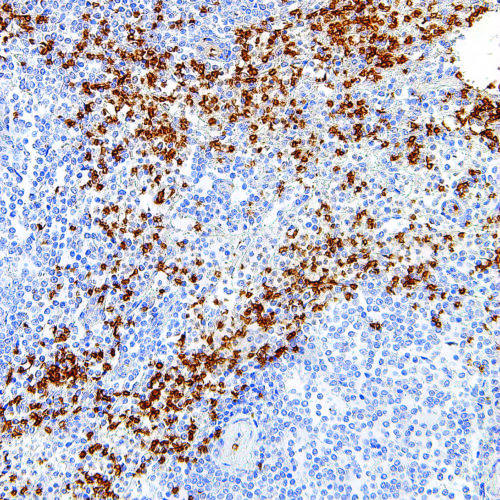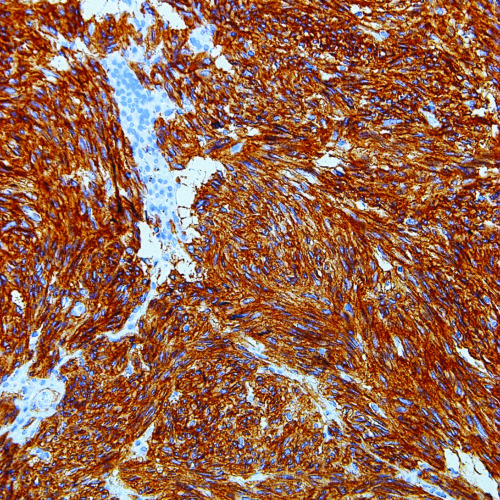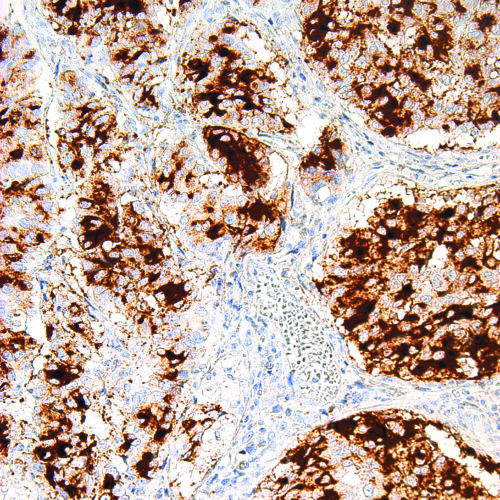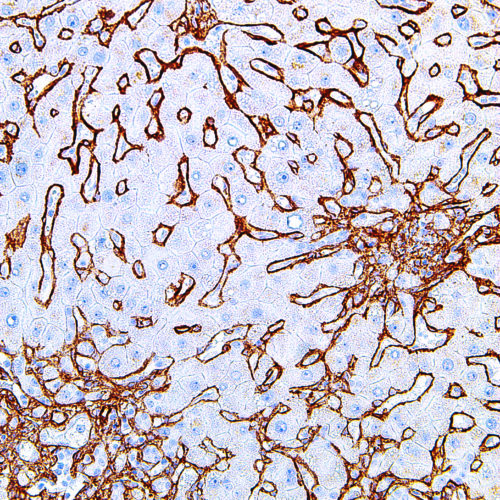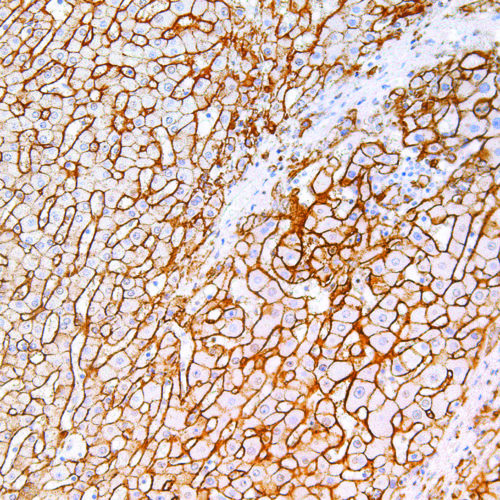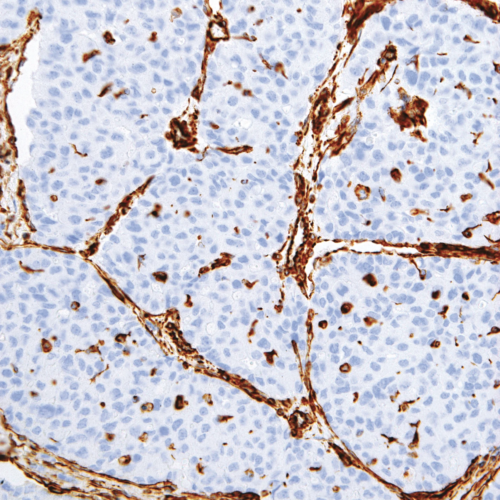High quality products to support Pathologists and Biological and Environmental Scientists
GeneAb™ Myogenin
$95.00 – $380.00Myogenin belongs to a family of myogenic transcription factors, including MyoD, myf5, and MRF4, which are critical in muscle development. Myogenin is found strictly in cells of skeletal muscle origin, and is therefore used as a biomarker for tumors of the muscle lineage, including alveolar rhabdomyosarcomas. Anti-Myogenin staining may occur in Wilms’ tumor, and labels the nuclei of myoblasts in developing muscle tissue. It is also expressed in some leiomyosarcomas.
GeneAb™ MDR3
$210.00 – $980.00Multidrug Resistance 3 (MDR3), also known as ATP Binding Cassette Subfamily B Member 4 (ABCB4), is a membrane-associated protein belonging to the superfamily of ATP-binding cassette transporters. MDR3 is an energy-dependent phospholipid efflux translocator that mediates the translocation of phosphatidylcholine across the canalicular membrane of the hepatocyte, and also acts as a positive regulator of biliary lipid secretion. Defects in MDR3 are associated with progressive familial intrahepatic cholestasis type 3 and gallbladder disease type 1. Co-overexpression of MDR3 and MRP1 has been documented as correlating with blastemal subtype and high-risk prognosis of Wilms’ tumor patients.
GeneAb™ Glycophorin A
$80.00 – $215.00Glycophorin A (GPA) and Glycophorin B (GPB) are erythrocyte blood group determinants that minimize erythrocyte aggregation during the circulation of blood. Anti-Glycophorin A is useful for understanding erythroid cell development and identifying erythroid leukemias.
GeneAb™ DOG1
$50.00 – $195.00DOG1, also known as Discovered on GIST-1, is a marker that highly specific for gastrointestinal stromal tumor (GIST). Anti-DOG1 is extremely sensitive for the detection of GIST and its diagnosis. Although some GIST stain weakly for c-kit, DOG1 is expressed in the vast majority of GIST cases. Reports have also indicated DOG1 as a marker for salivary acinar and intercalated duct differentiation.
GeneAb™ BG8, LewisY
$115.00 – $390.00BG8 LewisY, also known as LewisY blood antigen or simply BG8, is a blood group antigen that has been identified in many studies as a potential marker for differentiation between pulmonary adenocarcinoma (PACA) and epithelioid mesothelioma (EM). It has been reported that sensitivity of non-mesothelial antigens for adenocarcinoma is organ-dependent. When attempting to differentiate epithelioid mesothelioma from adenocarcinoma, BG8 LewisY performed at a sensitivity of 98% in the breast cancer group, and 100% in the lung cancer group.
GeneAb™ Collagen Type IV
$85.00 – $340.00Collagen Type IV is a primary component in the basal lamina that is used as a marker to observe the presence of the lamina and examine its structure. In addition to the epithelial basal lamina, Anti-Collagen Type IV stains mesenchymal components. It is useful for identifying soft tissue cancers including schwannomas and leiomyomas. Anti-Collagen Type IV frequently reacts with these tissues after becoming well-differentiated and malignant. The use of Anti-Collagen Type IV produces more reliable results than non-specific silver reticulum stains when investigating the vascular elements of neoplasms, hemangiopericytoma, angiosarcoma and epithelioid hemangioendothelioma.
GeneAb™ CD138
$90.00 – $350.00Cluster of differentiation 138 (CD138), also known as Syndecan-1, is a transmembrane glycoprotein present on the surface of B-cells during late stage differentiation. Anti-CD138 is used to differentiate marginal zone lymphoma from lymphoplasmacytic lymphoma. ALK Large B-Cell Lymphoma (LBCL) commonly stains positively for CD138, but not for CD20 and CD79a. Anti-CD138 reacts positively with HHV8-associated primary effusion lymphoma that lack B-cell markers. CD138 is also a useful marker for identifying and enumerating benign, reactive, or malignant plasma cells from the bone marrow biopsy samples.
GeneAb™ Vimentin
$60.00 – $290.00Vimentin is a component of intermediate filament in mesenchymal cells, such as endothelial cells, fibroblasts, lymphocytes, and melanocytes. Anti-Vimentin is useful for assessing whether tissue samples have been processed and preserved properly. A panel of Anti-Vimentin and Anti-Keratin is useful for differentiating melanomas from large cell lymphomas and undifferentiated carcinomas. This diagnostic grade Vimentin IVD antibody stains melanomas and schwannomas, as well as Endometrial endometrioid adenocarcinomas.
